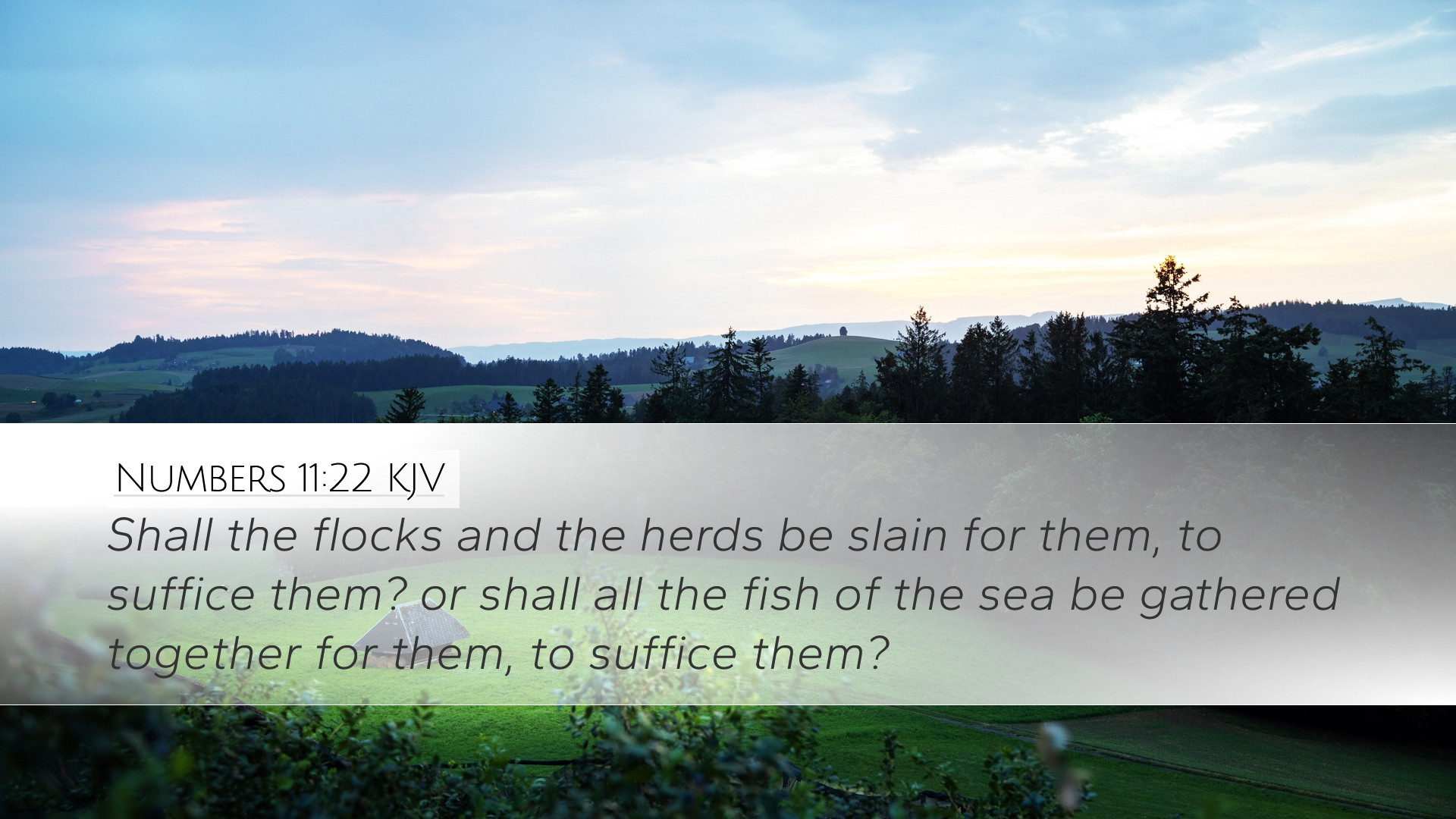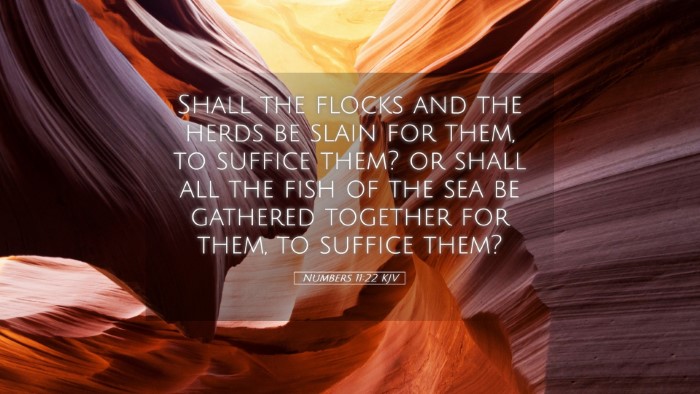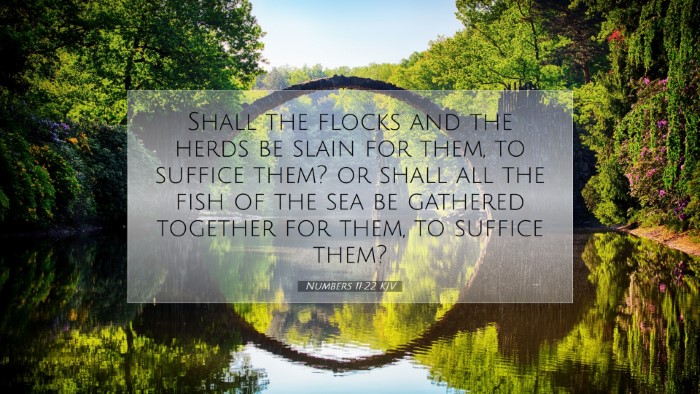Commentary on Numbers 11:22
Verse: "Shall the flocks and the herds be slain for them, to suffice them? or shall all the fish of the sea be gathered together for them, to suffice them?" (Numbers 11:22, KJV)
Introduction
The verse presented is part of a broader narrative where Moses laments the burden of leading the people of Israel and questions God's provision in the face of their craving for meat over manna. This commentary will explore both the historical context and the theological implications embedded in the text, drawing insights from respected public domain commentaries including Matthew Henry, Albert Barnes, and Adam Clarke.
Contextual Analysis
Numbers 11 recounts the incidents of the Israelites in the wilderness. They express dissatisfaction with the miraculous provision of manna and crave the flesh pots of Egypt (Numbers 11:4). Moses, overwhelmed by the demands of the people, turns to God, pleading for help. God then responds by promising to provide meat, which leads to the question raised in verse 22. This verse highlights the tension between divine provision and human expectation.
Matthew Henry's Perspective
Matthew Henry notes that in this verse, Moses is expressing a deep skepticism about God’s ability to provide for the Israelites' needs in the wilderness. He points out that Moses asks if God will slaughter all the flocks and herds to satiate the people’s desires. Henry underscores the absurdity of Moses' complaint, suggesting that it demonstrates a lack of faith in God's omnipotence. He emphasizes that God's ways are higher than human expectations, and His provisions are often beyond what we can comprehend.
Albert Barnes' Insights
Albert Barnes comments on the rhetorical nature of Moses' questions. He argues that Moses is not literally suggesting a mass slaughter of livestock, but rather highlighting the impossibility of fulfilling such a need. Barnes emphasizes the lack of foresight in the senior leader's remarks, indicating that Moses underestimates God's provision. In essence, Barnes is urging readers to understand that God's plans can meet our needs in ways we do not anticipate.
Adam Clarke's Understanding
Adam Clarke provides a detailed exegesis of the verse that emphasizes God's abundant resources as a response to Israel’s wants. Clarke interprets Moses’ question as an expression of disbelief regarding God's miraculous provision. He suggests that Moses' lack of faith could provoke divine displeasure. Clarke's commentary ultimately leads to the principle that God’s resources and ability to sustain His people far exceed their grasp of reality.
Theological Implications
This verse invites readers to reflect on key theological themes related to provision, faith, and the nature of God's relationship with His people.
Divine Provision
The central question of whether God can adequately provide for the people raises significant theological considerations. The Israelites' physical needs are juxtaposed with their spiritual deficiencies. Here, the issue is not solely about hunger but rather about trust in God’s goodness and sovereignty. This invites pastors and theologians to explore the nature of God's provision in their own lives and contexts.
Faith and Doubt
Moses' doubts reflect a common human struggle with faith. The commentary emphasizes that doubts can lead to a weakened relationship with God. This is particularly relevant for students of theology who are encouraged to cultivate a faith that sees beyond present circumstances. The dialogue encourages believers to confront their own limitations in understanding God's plans and provisions.
Community Leadership
Moses’ leadership is questioned in this narrative. Pastors and leaders are reminded that they must navigate the desires and demands of their communities while maintaining a strong reliance on God. Henry suggests that leaders may also experience times of despair and doubt but must be guided by faith in God’s provision and promises.
Reflective Application
This verse serves as a profound reminder for believers and leaders alike. There are several critical takeaways:
- The Sovereignty of God: The commentary collectively emphasizes that God’s plans are not constrained by human limitations.
- The Importance of Faith: The narrative encourages readers to foster trust in God amidst uncertainty and dire circumstances.
- Leadership in Crisis: The events depicted offer lessons in crisis management for leaders, noting that lament or doubt does not disqualify them from God’s service.
- God's Abundant Care: The text reassures believers that God is more than capable of providing for their needs, often in miraculous ways beyond understanding.
Conclusion
Numbers 11:22 invites a deeper understanding of the dynamic relationship between God and His people, particularly regarding provision and faith. The commentaries reveal that while human doubts are natural, they must be continuously brought to God in prayer and reflection. By learning from the pitfalls of Moses’ experience, both pastors and laypeople can cultivate a renewed faith that looks for God's hand in every situation. In overcoming doubt, they can better guide their communities towards a deeper trust in God’s goodness and love.


